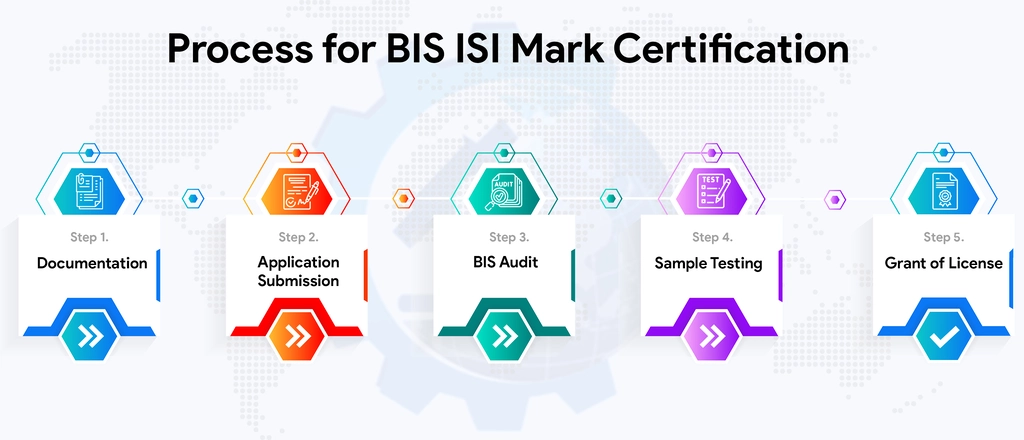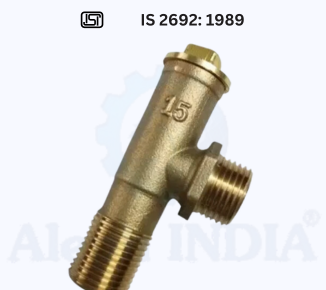BIS CERTIFICATION for Ferrules For Water Services IS 2692: 1989
Published Date: November 6, 2024 4 min Read
Introduction
IS 2692: 1989 is an Indian standard that prescribes the requirements for ferrules used in water services under BIS Certification. Ferrules are among the small fittings connected to the water supply pipes with the main pipeline. It plays an important role in the plumbing industry, ensuring the connections are secure and reliable. Ferules are primarily used for the final distribution of water, which is used to effectively distribute water in homes and institutions.
Hence, ferrules must be fitted correctly to ensure that water flows evenly without leakage, which is the prime requirement for public health and sanitation reasons. The strength of ferrules lies in the market due to increasing demands in urban and rural water supply infrastructure. Ferul IS 2692 is certified and ensures the reliability of quality standards, thereby increasing market acceptance and credibility for consumers and contractors.
OVERVIEW
This standard, IS: 2692: 1989, specifies requirements for copper alloy screw-down ferrules used in mains of water supply. According to this standard, it will provide nominal sizes, materials, manufacturing, workmanship, sampling, and testing that assure reliability and safety. The ferrules shall resist corrosion, handle pressure, and maintain the ability to last long. This improves all water distribution systems and ensures people's health.
Key highlights
| Product Name | Ferrules For Water Services |
| Applicable Indian Standard | IS 2692: 1989 |
| Applicable Certification Scheme | Product Certification Scheme (ISI Mark Scheme) Scheme 1 |
| Applicable Mark: | BIS Standard Mark (ISI Logo) |
| Compliance Requirement | Mandatory |
| Quality Control Order | Click here |
| Ministry | MINISTRY OF COMMERCE AND INDUSTRY |
| Scope as per Standard | This standard lays down nominal sizes and requirements regarding material, manufacture and workmanship, construction, sampling and testing of copper alloy screw-down ferrules for use on water supply mains. |
| Major Country of Import | Countries include but are not limited to the USA, Germany, and China. |
Applicable Tests
Mandatory Tests:
- Dimensions
- Manufacture and workmanship
- Construction
Optional Tests:
- Body, Plug and cap
- Leaded tin bronze
- Physical Test
- Chemical Composition

Note
For Detailed Information about the Procedure for BIS ISI Certification, Visit :
Timeline for BIS Certification
The approximate timeline to obtain BIS certification for Ferrules For Water Services IS 2692: 1989 is as follows:
- For Indian Manufacturers (Standard Timeframe – 30 days)
- For Foreign Manufacturers (Standard Timeframe – 180 days)
Benefits of BIS Certification
BIS certification enhances product credibility, boosts consumer trust, expands market access, and provides a competitive edge for manufacturers.
| Benefit | Description |
|---|---|
| Access to the Indian Market | BIS certification is essential for numerous products, facilitating smooth entry and trade in India. |
| Compliance with Indian Standards | It ensures adherence to national safety and quality standards, promoting uniformity and reliability. |
| Enhanced Product Credibility | Certification serves as a mark of quality assurance, helping products stand out in a crowded marketplace. |
| Increased Customer Trust | Consumers are more inclined to purchase certified products, confident in their safety and performance. |
| Benefits for MSMEs | Small and medium enterprises gain a competitive edge and access to government tenders through BIS certification. |
Conclusion
BIS certification is a strategic asset that supports quality assurance and market growth for businesses in India. ALEPH INDIA helps manufacturers achieve this vital certification.
Aleph INDIA has been serving the industry as a single-window operator for all product regulatory compliance. We can assist importers or manufacturers in meeting all criteria for importing or selling a product in the Indian market.
Frequently Asked Questions
International Audits & Participation
Testimonials
BIS REGISTRATION FOR ELECTRONIC & IT PRODUCT
In the era of globalization, world trade is growing rapidly and henceforth, Manufacturing and Import/Export businesses are also growing drastically...View More
BIS CERTIFICATE FOR FOREIGN MANUFACTURER
The Economy of India-the fastest developing economy on the globe with the capabilities that help it matches up with the biggest international...View More
PRODUCT CERTIFICATION SCHEME (ISI MARK) FOR DOMESTIC MANUFACTURERS
Anything a person buys from food to cars, clothes to electronics, branded to unnamed products there is always a question that wanders in one’s...View More
WIRELESS PLANNING AND COORDINATION (WPC)
WPC: Wireless means communication done from one point to another point without the wires and cables. Electromagnetic waves carry the ...View More
BUREAU OF ENERGY EFFICIENCY (BEE) CERTIFICATE
BEE CERTIFICATE: Energy is the future, and its conservation is the way of the bright future. Everyone claims the environment is important...View More
E-WASTE MANAGEMENT
E-waste is one of the world's fastest-growing trash streams. We currently manufacture almost 50 million tones of it each year...View More
View All Services
Request a call back.
Would you like to speak to one of our Senior Technical advisers over the phone? Just submit your details and we’ll be in touch shortly. You can also email us if you would prefer.






























